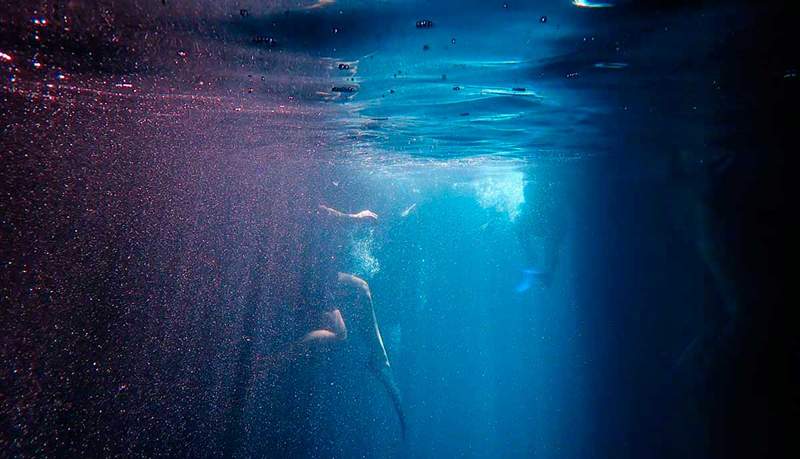Hydrophobia, irrational fear of water

- 3969
- 385
- Jeffery Jones
Hydrophobia is irrational fear of water. Who suffers it is prevented from going to places where there is water, such as the sea or the pools. There are extreme cases in which some people fear even drinking water.
Although studies indicate the multiple benefits of consuming water, or being in contact with water, not all people can do so.
The word Hydrophobia comes from the Greek "hydro", which translates as "water", and "phobos", which means "fear". Thus, hydrophobia is the fear of water.
People who suffer from hydrophobia have a hard time practicing swimming, for example, although it is known that this helps improve body posture, relieve tensions or have good mood.
However, these people fail to enjoy all these benefits, and The condition is worse when they fear ingesting water, since this brings serious consequences for health, such as dehydration.
Hydrophobic people also feel fear of taking the bath under the shower, or to undertake any activity that involves having contact with water.
In principle, it is worth distinguishing people who fear getting into contact with water for fear of being danger, for not having the ability to swim, of those people who really have an irrational phobia. In the first case, fear is not the water itself.
In some cases, people close to those who suffer from hydrophobia do not realize the situation, since it is rare that the hydrophobic subject is exposed to situations that betray their fear.
However, there are other people who do feel strong anxiety and this brings them suffering, especially when they must enter public baths, drink water or shower. Indeed, in these cases, the quality of life is negatively impacted.
Content
Toggle- Hydrophobia symptoms
- Causes of hydrophobia
- Hydrophobia treatment
- Conclusions
- Bibliography
Hydrophobia symptoms
The symptoms of hydrophobia are shared with those experienced by subjects suffering from anxiety disorders.
Thus, when they see the water, they present the following symptoms:
- Tachycardia
- Dizziness
- Hyperventilation
- Nervousness
- Vomiting
- Stomachache
- Sweating, among others.
These symptoms They are usually accompanied by irrational ideas that only increase anxiety levels.
Patients manifest catastrophic ideas of everything that could happen to them if they become in contact with water.
There are cases in which People fear drowning if they drink water, as well as those who think that water is harmful.
Causes of hydrophobia
Among the causes of hydrophobia, some research highlights the difference between physical and psychological fears.
In the case of fear for physical insecurity, the person mentally anticipates all the damage he may suffer, and This produces a state of inhibition that alters its performance and what is so afraid of: damage or injuries.
When fears arise from psychological threats, and they are adults, they are related to The fear of failure, competition, or social ridiculous.
Some people may also feel fear of water for have lived or witnessed traumatic experiences, as shipwrecks or having seen people out of drowning.
Nevertheless, There are those who have never been in the presence of the situations described and still develop the condition.
Hydrophobia treatment
The good news for these people is that, With therapeutic treatments, normality can be recovered of the life.
Sometimes, The specialist can apply behavioral cognitive techniques to help you disappear gradually.
These techniques can range from the direct water exposure, stressful environments, or others, providing the patient with Tools to reduce anxiety.
Similarly, you can work based on irrational beliefs that make fears persist. Also, relaxation techniques are usually included.
Conclusions
Suffering from hydrophobia can be limiting. A good recommendation that is always useful is Make an analysis on the subject, from scientific perspective, to fully understand that there is nothing to fear.
Although the recovery process can take time, The forecasts are favorable. If the person considers that he cannot achieve it for herself, it is time to seek psychological support and recover normality.
Many people suffering from hydrophobia often associate the lack of breath that occurs when immersing the water, with something catastrophic. It is worth remembering that This does not mean that life is in danger, but that it is only an unfounded belief. Therefore, cognitive restructuring is very helpful for these patients.
Bibliography
- GEOVANA INKNOY AJNO. (2013). Phobia. Clinical Update Magazine.
- BONET, J. Yo. C. (2001). Effective psychological treatments for specific phobias. Psychothema.
- Capafons Bonet, J. Yo. (2001). Effective psychological treatments for specific phobias. Psychothema.
- Mirnagaray Valdés, J. (1967). The phobias. Rev. Hosp. PSYCHIAT. Havana.
- Salguero del Valle, to., Tuero, c., Prado, d., & González Boto, R. (2003). The fear of water: strategies and methodological resources to overcome it. University of Leon.

